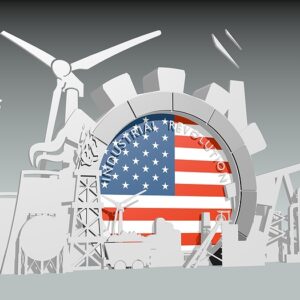In office and on the campaign trail, the Biden administration is relentlessly pursuing what the president’s former National Economic Council director calls a “21st Century American Industrial Strategy” centered on “strategic public investments” to achieve our full economic potential. It has the support of most Democrats and quite a few Republicans and is in some ways a logical extension of Donald Trump’s past support for favored industries through tariffs paid by American consumers.
Perhaps those leaders would be more hesitant if “industrial policy” was called “socialism.” In many ways, the description fits.
Biden’s signature industrial policy initiatives are the Inflation Reduction Act (IRA) and the CHIPS and Science Act. Using tax incentives, the former attempts three difficult things at once: fighting climate change, strengthening energy security, and creating good-paying jobs. Tax credits are paid to drivers who purchase electric cars, to homeowners who install efficient heat pumps, and to investors who build factories and power plants to equip the clean energy transition. It’s estimated to cost taxpayers between $800 billion and $1.2 trillion.
The CHIPS Act also aims to create jobs (especially in manufacturing), to “strengthen supply chains,” and to “accelerate the industries of the future.” It provides $52 billion for U.S. semiconductor research, development, manufacturing, and workforce development, and a 25 percent investment tax credit for capital expenses for the manufacture of semiconductors and related equipment.
All House and Senate Democrats voted for the IRA, and when it came to the CHIPS Act, 24 House and 17 Senate Republicans joined them. Considering Trump’s trade wars and spending spree and GOP interest in the private affairs of Disney, TikTok and others, the party seems increasingly uninterested in its old brand of economic freedom.
Florida Sen. Marco Rubio, for example, has been a strong advocate for industrial policy, calling it the “21st Century Pro-American Industrial Policy.” Indiana Sen. Todd Young, a CHIPS Act sponsor, says subsidies will “supercharge” manufacturers’ impact.
These days, “socialism” is more often used as a term of opprobrium than as a description of an economic theory. And it’s hardly one that Republicans have embraced. So, why do we think it’s an apt description of industrial policy?
In a free market, private individuals own the means of production — firms and capital — but must take their cues from consumers. A private firm that fails to offer us value in excess of the prices we pay won’t last long. Because of this, we consumers end up determining which firms and industries thrive and which fail.
In a traditional socialist economy, the state owns the means of production, and managers of state firms take their cues from central planners. Socialist managers can safely ignore the desires of paying consumers because they get their resources from the state. Bureaucracy determines which state factories and which sectors thrive and which do not. In the Soviet Union, the military-industrial complex won, while housing and consumer goods lost.
Industrial policy tries to have it both ways. Private individuals still own the firms and capital, but they take their cues from government central planners. If consumers prefer hybrids, planners believe they can override these preferences in favor of fully electric vehicles, using taxpayer money to facilitate those purchases.
Another core feature of traditional socialism is the suppression of the profit motive that drives efficient production and distribution. Soviet producers had little incentive to use productive resources efficiently. Their funding came from central planners who cared about reaching production targets rather than producing output as efficiently as possible.
Under industrial policy, access to government funding depends less on efficiency than on how effectively a firm lobbies its government. Firms profit by creating value for politicians rather than customers. That’s how the traditional socialist system worked. Political acumen displaced technical know-how and customer focus.
Conservative supporters of industrial policy defend it on national security grounds, saying it will allow the United Staters to contain and outcompete “Communist China.” Soviet leaders justified their own system on similar grounds, arguing that the very existence of the capitalist West justified devoting an enormous share of their economy — more than 25 percent — to the military and much of the rest to heavy industry like steel.
The focus on the West helped distract from the corruption of Soviet politicians and party members. That is, until the inefficiency of a state-directed economy brought the whole system crashing.
It is hoped industrial policy will never become as entrenched here as socialism was there. If it does, China — or someone else — will have an easier time outcompeting the United States.



